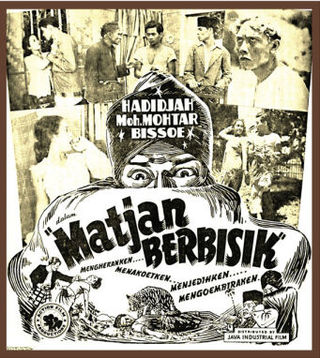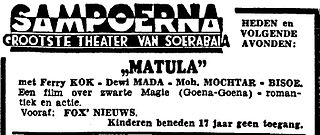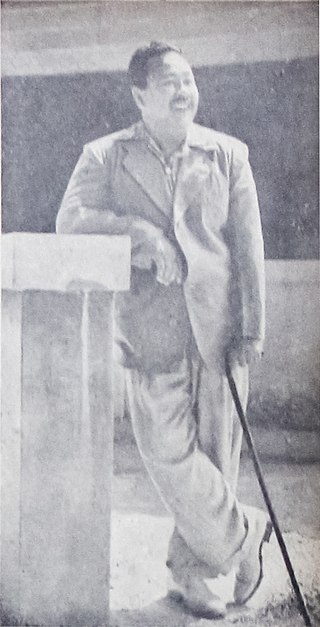
Pah Wongso Pendekar Boediman is a 1941 detective film from the Dutch East Indies. The first production by Star Film, it was produced by Jo Eng Sek and features camerawork by Cho' Chin Hsin. Starring Pah Wongso, Elly Joenara and Mohamad Arief, it follows the social worker Pah Wongso as he investigates a murder to clear his protégé's name.

Kedok Ketawa is a 1940 action film from the Dutch East Indies. Union Films' first production, it was directed by Jo An Djan. Starring Basoeki Resobowo, Fatimah, and Oedjang, the film follows a young couple who fight off criminals with the help of a masked man.

Zoebaida is a 1940 film from the Dutch East Indies directed by Njoo Cheong Seng. A romance set in Timor, it starred Njoo's wife Fifi Young and was the film debut of Soerip. Shot over a period of 27 days in a Dutch-owned studio, the film received middling reviews. It is likely lost.

Air Mata Iboe is a 1941 drama film from the Dutch East Indies directed and written by Njoo Cheong Seng. Starring Fifi Young, Rd Ismail, Ali Sarosa, and Ali Joego, it followed a mother who raises her children lovingly but is ultimately betrayed by her eldest sons when she falls upon hard times. The film, billed as a "musical extravaganza," featured a soundtrack by R. Koesbini, and an eponymous title song written by Njoo.

Panggilan Darah is a 1941 film from the Dutch East Indies written and directed by Sutan Usman Karim and produced by Tjho Seng Han for Oriental Film. The black-and-white film starred Dhalia and Soerip as orphaned sisters trying to make a living in the colonial capital of Batavia before moving to Kudus to work at a clove cigarette factory.

Matjan Berbisik is a 1940 film from the Dutch East Indies which was directed by Tan Tjoei Hock and produced by The Teng Chun. Starring Hadidjah and Mohamad Mochtar, the film follows two men who are raised as brothers and compete for the love of the same woman. A copy of the black-and-white film, which featured keroncong music, is stored at Sinematek Indonesia.

Srigala Item is a 1941 film from the Dutch East Indies that was directed by Tan Tjoei Hock and produced by The Teng Chun for Action Film. Starring Hadidjah, Mohamad Mochtar, and Tan Tjeng Bok, the film's plot – inspired by Zorro – follows a young man who became a masked vigilante to take revenge against his conniving uncle. Srigala Item was a commercial success, which Misbach Yusa Biran credits to the plot's use for escapism. A copy of the black-and-white film, which featured kroncong music, is stored at Sinematek Indonesia.

Asmara Moerni is a 1941 romance film from the Dutch East Indies directed by Rd Ariffien and produced by Ang Hock Liem for Union Films. Written by Saeroen, the film followed a doctor who falls in love with his maid, as well as her failed romance with a fellow villager. Starring Adnan Kapau Gani, Djoewariah, and S. Joesoef, the black-and-white film was cast and advertised to cater to the growing native intelligentsia. Despite mixed reviews, it was a commercial success. As with most films of the Indies, Asmara Moerni may be lost.

Matula is a 1941 film from the Dutch East Indies which was directed by Tan Tjoei Hock and produced by The Teng Chun of Java Industrial Film. The black-and-white film, now likely lost, follows a young man who tries to give a woman's soul to a shaman as payment for being made handsome.

Wanita dan Satria is a 1941 film from the Dutch East Indies directed by Rd Ariffien and produced by Ang Hock Liem for Union Films that is probably lost. Starring Djoewariah, Ratna Djoewita, Hidajat, Z. Algadrie, and Moesa, it follows a womaniser named Soedrajat who abuses his status to gain women's trust before ultimately getting his comeuppance. Reviews were mostly positive, with one praising the film's depiction of women's issues in a Muslim society.
Moestika dari Djemar is a 1941 film from the Dutch East Indies. Multiple modern sources also use the incorrect spelling Moestika dari Djenar, but contemporary sources uses an "m".

Dhalia was an Indonesian actress active for over fifty years. She was nominated for three Citra Awards at the Indonesian Film Festival, winning one.

Ng. Ratu Djoewariah was an Indonesian actress active in the 1940s and 1950s.

Tjioeng Wanara is a 1941 film from the Dutch East Indies directed and produced by Jo Eng Sek. Starring R Sukran, Elly Joenara and AB Djoenaedi, it featured more than 500 people in supporting roles. The film follows a young prince named Tjioeng Wanara who must reclaim his throne from the cruel King of Galuh; it is adapted from the Sundanese legend of the same name.

Anastasya Soerip was an Indonesian singer and actress.

Union Films was a film production company located in Batavia, Dutch East Indies. Established by ethnic Chinese businessmen Ang Hock Liem and Tjoa Ma Tjoen in 1940, it produced seven black-and-white films before it was dissolved in 1942; all are thought to be lost. The company's films were directed by four men, mostly ethnic Chinese, and launched the careers of actors such as Rendra Karno and Djoewariah.

Oriental Film was a film production company in Batavia, Dutch East Indies. Established by ethnic Chinese businessman Tjo Seng Han in 1940, it completed four black-and-white films before it was closed in 1941. All the company's films were screened into the 1950s but may now be lost. They were directed by two men, Njoo Cheong Seng and Sutan Usman Karim, and launched the careers of actors such as Dhalia and Soerip.

Pah Wongso Tersangka, also known under the Dutch title Pah Wongso Keert Terug, is a 1941 film from the Dutch East Indies directed by Wu Tsun for Star Film. Saeroen's first work for the company, it is a sequel to the 1940 detective film Pah Wongso Pendekar Boediman, and stars the social worker L. V. Wijnhamer, Jr as a man who comes under suspicion and must clear his name. This possibly-lost film was styled as a comedy.

S. Poniman was an Indonesian kroncong singer and comic actor. Born in Banda Aceh in 1910, he took up singing and made his way to Batavia. In 1940 he made his debut as music director and actor on the film Kedok Ketawa, completing three further productions before the Japanese occupation brought film production to a near-standstill. Poniman spent time as a soldier and truck driver before returning to the film industry in 1951, after Indonesia's independence, as a star of Dunia Gila. Between 1951 and 1958 he appeared in more than twenty films before leaving the struggling industry to become a trader. Though he appeared in several further films before his death, Poniman never regained his stardom.


















